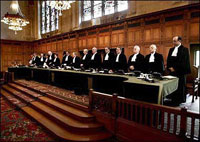International Law is Illegal
The day of December 8 marked important hearings about the legal grounds of Kosovo’s independence. Russian and US officials appeared at the International Court of Justice in The Hague to express their points of view regarding the matter. It goes without saying that the views of US and Russian officials about the actions taken by Kosovo Albanians are absolutely different.

The judges will have to decide whether the single-handed declaration of Kosovo’s independence meets the norms of the international law.
The hearings began on December 1 and will continue before Dec. 11. The final decision will be announced only in April of 2010. Twenty-eight countries, including Russia and the United States of America, showed their willingness to participate in the dispute.
Russia, China, India, Brazil, Argentina, Spain, Greece, Slovakia, Belarus, Azerbaijan and other countries support Serbia. All these countries refuse to recognize Kosovo’s independence claiming that it is a gross violation of the international law.
Kosovo enjoys the support of the USA, Germany, France, Britain, Austria, Finland, Slovenia, Albania and others. These countries acknowledged the alienation of the region from Serbia. Many of them were involved in the bombings of Yugoslavia ten years ago.
Kirill Gevorgian, a Russian Foreign Ministry official, said in his speech at the court on December 8 that Resolution 1244 passed by the UN Security Council in 1999, which approved the deployment of international forces in Kosovo, guaranteed Serbia’s territorial integrity.
“Resolution 1244 is still in effect. Russia believes that the single-handed declaration of Kosovo’s independence contradicts to Resolution 124 and to the international law,” the official said.
Mr. Gevorgian also said that the document barred making decisions single-handedly. The declaration of Kosovo’s independence on February 17, 2008 was a one-sided decision, which the Albanians made without any preliminary talks with Serbia.
Gevorgian said that it was only the UN Security Council that could withdraw the temporal international regime introduced in Kosovo in accordance with Resolution 1244.
“The gross violation of human rights in Kosovo during the 1990s can not justify the single-handed declaration of the region’s independence in 2008. The international law does not allow Kosovo declare independence since the population of Kosovo does not have the right to self-determination,” the official said.
It is worthy of note that the right to independence spreads on colonies, dependant or occupied territories. In addition, the peoples that do not have a national state of their own can use the right too. The Kosovo Albanians had such a state – it is called Albania.
US legal delegation head Harold Hongju Koh urged the International Court to keep the declaration of Kosovo’s independence unchanged and undisturbed since the document was an expression of the will of Kosovo’s people. The International Court of Justice should acknowledge the right for Kosovo’s separation, because Kosovo, as Koh said, is a “special case.”
The US official said that the above-mentioned resolution suggests Kosovo’s independence as the final result. He said that nine of 15 UN Security Council members supported the region’s independence, and all of those countries supported Resolution 1244 in 1999.
Mr. Koh proceeded with saying that the resolution guaranteed independence to the collapsed state – the Republic of Yugoslavia – but not to Serbia. In addition, US officials believe that the resolution will become null and void as soon as the power is delegated to governmental agencies, which the Albanians created with the participation of the West.
Finally, Mr. Koh said that Kosovo’s independence is justified given historical abuses of the area’s non-Serb population. “About 10,000 Albanians were killed and a million of them were expelled,” he said.
Koh did not specify the source of his information about the slain Albanians. Nor did he mention that several thousands of Serbs were killed and 250,000 were forced to flee during the recent ten years.
As for one million of Albanian refugees – the Albanians started to flee after March 24, 1999, when the bombing of Yugoslavia began. The Unified Republic of Yugoslavia has legal successors – Serbia and Montenegro. Kosovo is a part of one of Yugoslavia’s regions – Serbia – and never existed as Yugoslavia’s constituent.
Interestingly enough, the final decision of the judges will be only a recommendation. Kosovo’s independence cast doubts on the existence of the international law.
Vadim Trukhachev
Pravda.Ru
Subscribe to Pravda.Ru Telegram channel, Facebook, RSS!





